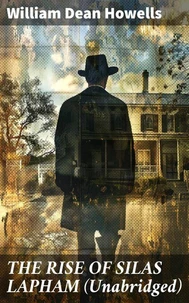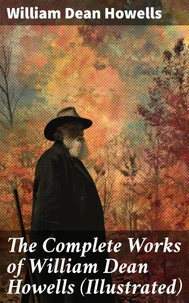The Landlord at Lion's Head — Complete. Exploring social class and ambition in post - Civil War New England
Par :Formats :
Disponible dans votre compte client Decitre ou Furet du Nord dès validation de votre commande. Le format ePub est :
- Compatible avec une lecture sur My Vivlio (smartphone, tablette, ordinateur)
- Compatible avec une lecture sur liseuses Vivlio
- Pour les liseuses autres que Vivlio, vous devez utiliser le logiciel Adobe Digital Edition. Non compatible avec la lecture sur les liseuses Kindle, Remarkable et Sony
 , qui est-ce ?
, qui est-ce ?Notre partenaire de plateforme de lecture numérique où vous retrouverez l'ensemble de vos ebooks gratuitement
Pour en savoir plus sur nos ebooks, consultez notre aide en ligne ici
- Nombre de pages287
- FormatePub
- ISBN406-4-06-618483-4
- EAN4064066184834
- Date de parution19/05/2021
- Protection num.Digital Watermarking
- Taille3 Mo
- Infos supplémentairesepub
- ÉditeurGOOD PRESS
Résumé
In "The Landlord at Lion's Head, " William Dean Howells presents a nuanced exploration of American society through the lens of a small-town landlord, delving into themes of social class, morality, and personal ambition. Howells employs a realist literary style, characterized by meticulous attention to character development and everyday life, reflecting the values and tensions of post-Civil War America.
The narrative intricately weaves a tapestry of interpersonal relationships and societal expectations, revealing the intricacies of human motivations and the ramifications of personal choices in a rapidly changing landscape. William Dean Howells, often regarded as the 'dean of American letters, ' was deeply influenced by his experiences as a journalist and editor, which honed his perceptive understanding of cultural and social dynamics.
His advocacy for realism over romanticism stemmed from his belief that literature should reflect the complexities of everyday existence. This perspective is evident in "The Landlord at Lion's Head, " where he captures the psychological intricacies of his characters amidst the trials of modernity, derived from his own reflections on society and morality during a transformative era in American history.
This work is an essential read for anyone interested in American literature and the evolution of social consciousness in the 19th century. Howells' keen observations and rich prose invite readers to engage deeply with the moral dilemmas faced by his characters, making it a timeless exploration of the human condition that resonates even today.
The narrative intricately weaves a tapestry of interpersonal relationships and societal expectations, revealing the intricacies of human motivations and the ramifications of personal choices in a rapidly changing landscape. William Dean Howells, often regarded as the 'dean of American letters, ' was deeply influenced by his experiences as a journalist and editor, which honed his perceptive understanding of cultural and social dynamics.
His advocacy for realism over romanticism stemmed from his belief that literature should reflect the complexities of everyday existence. This perspective is evident in "The Landlord at Lion's Head, " where he captures the psychological intricacies of his characters amidst the trials of modernity, derived from his own reflections on society and morality during a transformative era in American history.
This work is an essential read for anyone interested in American literature and the evolution of social consciousness in the 19th century. Howells' keen observations and rich prose invite readers to engage deeply with the moral dilemmas faced by his characters, making it a timeless exploration of the human condition that resonates even today.
In "The Landlord at Lion's Head, " William Dean Howells presents a nuanced exploration of American society through the lens of a small-town landlord, delving into themes of social class, morality, and personal ambition. Howells employs a realist literary style, characterized by meticulous attention to character development and everyday life, reflecting the values and tensions of post-Civil War America.
The narrative intricately weaves a tapestry of interpersonal relationships and societal expectations, revealing the intricacies of human motivations and the ramifications of personal choices in a rapidly changing landscape. William Dean Howells, often regarded as the 'dean of American letters, ' was deeply influenced by his experiences as a journalist and editor, which honed his perceptive understanding of cultural and social dynamics.
His advocacy for realism over romanticism stemmed from his belief that literature should reflect the complexities of everyday existence. This perspective is evident in "The Landlord at Lion's Head, " where he captures the psychological intricacies of his characters amidst the trials of modernity, derived from his own reflections on society and morality during a transformative era in American history.
This work is an essential read for anyone interested in American literature and the evolution of social consciousness in the 19th century. Howells' keen observations and rich prose invite readers to engage deeply with the moral dilemmas faced by his characters, making it a timeless exploration of the human condition that resonates even today.
The narrative intricately weaves a tapestry of interpersonal relationships and societal expectations, revealing the intricacies of human motivations and the ramifications of personal choices in a rapidly changing landscape. William Dean Howells, often regarded as the 'dean of American letters, ' was deeply influenced by his experiences as a journalist and editor, which honed his perceptive understanding of cultural and social dynamics.
His advocacy for realism over romanticism stemmed from his belief that literature should reflect the complexities of everyday existence. This perspective is evident in "The Landlord at Lion's Head, " where he captures the psychological intricacies of his characters amidst the trials of modernity, derived from his own reflections on society and morality during a transformative era in American history.
This work is an essential read for anyone interested in American literature and the evolution of social consciousness in the 19th century. Howells' keen observations and rich prose invite readers to engage deeply with the moral dilemmas faced by his characters, making it a timeless exploration of the human condition that resonates even today.








